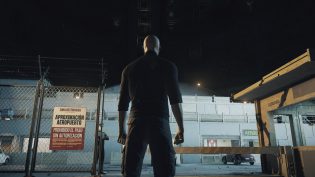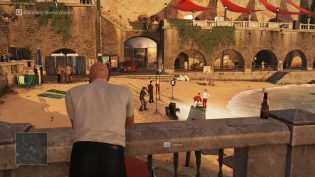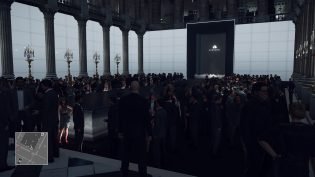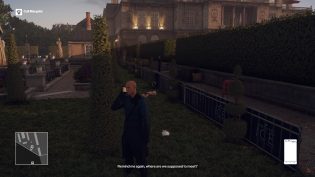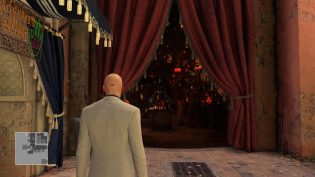Hitman series are 17 years old by now. They started out with Codename 47, a PC-exclusive fresh new take on the freeform stealth ideas introduced in Thief: The Dark Project. Where instead of stealth, it focused on “social stealth” and blending in, and instead of stealing, on the art of killing. Despite all the flaws, like unnecessary action-focused missions, incredibly simplistic concept of blending in with no in-between states of suspicion, and less complex AI patterns than the ones you get today, it remains an amazing game, with some of the best missions in the entire series (like “Traditions of the Trade” or “The Massacre at Cheung Chau Fish Restaurant”). Of course, most of the good stuff has been later remade in Hitman: Contracts, which might as well be considered the proper start of the series (Hitman 2 also being rather rough), which finally realized that pure stealth and pure action sequences just don’t fit the series. And Blood Money remains one of the best examples of the stealth games to this day.
Then we had Hitman: Absolution, which was… well… It was a rather cool stealth action game, but a terrible Hitman game. A linear, story-driven game, where social stealth and blending in usually worked against you, since most of the time being dressed as someone you want to blend in with meant higher of getting noticed. But a lot of the ideas and concepts introduced in that game were great, ready to be taken, modified and perfected to work in a proper Hitman game. And that’s what the game, simply called HITMAN, is – best ideas from all the previous games in one package. And then some.
After the previous misstep you would be forgiven to be cautious about how freeform the new Hitman is, but worry not – this is the proper Hitman game again. You have a mission, you plan what you want to carry with you and how, you go in, you perform the tasks, you go out. Not everything in terms of preparation and pre-mission stuff is available to you from the start, but the mission itself works out in the same, mostly realtime scheduled way every time. As such, this is, yet again, a game where you should never feel bad about failing and restarting, as it is part of the game experience.
However, this game might also be the absolute perfect blend of classic no-hand-holding approach to stealth and failure, and lots of little helpful modern design things. These ensure that you can complete the mission on your very first go (using saves, at least) in one of the best ways possible, but the whole experience still feels like you’re the smartest coolest person for pulling this off. The concept is called “opportunities” and it works as a guided way of using the intel you find efficiently. For example, you overhear someone talking about an important guest arriving soon who can get access to your target, and no one knows how they look like. Apart from this intel, you also get a chance to use the “opportunity” that will be guiding you (with or without target pointers in game and the map, depending on your choice in the options) to get to that guest and use this chance to get close to the target. It doesn’t give you the solutions away, just points you in the right directions and guides you through separate steps, while you still have to find out how to do things yourself. And while the oldschool Hitman players might want to disable it, I would actually advise against it, unless you really want the true oldschool experience, as the game is still all about replaying and “Opportunities” allow you to learn the routes, routines, levels and possibilities in them in the best way before you decide to disable all the help and do it yourself.
And do it yourself you can, with all the possibilities from Blood Money, plus a lot of the mechanics from Absolution. You can still use (or disable) the “Instinct” to see through walls, but the map is back (and minimap too) and together they’re used in perfect unison to simply make you pause the game less to look at the full map if you want to see where your target is right now. Accidents are still a thing and you can complete all the normal missions without ever using a weapon, since you can subdue other NPCs with your bare hands (you can still get the fiber wire and the syringe, though). The amount of objects on each level that can be interacted with is also astounding, with some of them available for the accident kills, some just for distractions. The concept of video recordings of 47 is back, though this time only works for the CCTV cameras and, as such, always allows you to destroy the evidence, and on normal difficulty the cameras are not used for spotting you (on Professional, their role is more important). You can do everything you could in previous games, and more.
Missions, on normal and professional, aren’t the only things to do too. Each location also has a bunch of things you can do in them, with different challenges, opportunities, special “escalation” missions. And the user made “contracts” from Absolution return, allowing you to create rules and targets for other players, and play their levels yourself. System of unlocks still feels a bit counter-intuitive, since the best way to play is supposed to be “silent assassin”, yet a lot of unlocks are weapons that won’t allow you to do that. But on the other hand, this game, much more than any other, allows you to just do silly stuff and have fun with it, so I really have no criticism for it. Except for that some might wish to play the missions on professional from the start, but it’s one of the unlocks instead, that requires you to complete the mission on normal first. I feel like it’s better to learn the level and possibilities on normal on the first go anyway, so it doesn’t feel like a bad decision, but some will find this restriction not to their liking.
What a lot of people disliked when the game was originally released, but isn’t as much of a problem now, is that it was episodic. It technically still is and any future content is supposed to be released as new episodes for the same base game. The idea for that isn’t bad, really. Each location and mission has a lot of fun content and Hitman, on its own, is a very per-mission type of game anyway, with only Absolution being a very linear experience. However, when you play all the episodes, it becomes clear that all the main missions come together as a complete proper Hitman game, instead of just being a collection of episodes. In both the gameplay and how missions go, and the story (which is as always in classic Hitman, more of a background meta-thing) there’s a very clear progression that gets lost if you have to wait months before playing the next part. It would’ve worked better if the game was released in full or in just 2 parts (like it was originally planned) with additional content, bonus missions or, that’s what I’d love to see, remakes of the best missions from previous games released as additional content post main release. Sadly, the episodic approach might return for the “Season 2” of the story and if so, personally I will be waiting until all the content is out, just as I did with the current content. Because no matter how good it is, and it is great, I’m not a fan of playing incomplete games.
I’m also not a fan of always-online games. HITMAN requires you to be online to play it as intended. If you, or the developers, have issues with the connection you’re down to a very cut down version of the game that lacks a lot of important things, even for just singleplayer, non-competitive play. The excuse, of originally Square Enix, and now IO Interactive independently, is the updates, leaderboards, the competitive side of missions and the Elusive Targets, but… I’m not buying it. It’s most likely still possible to cheat for leaderboards, updates can be done without always-online and the concept of “Elusive targets” seems to go against the idea and fun of HITMAN anyway. What they are, are the timed targets that you have only one shot at. If you die or when you kill them, you cannot replay the contract again. You usually have some time to prepare while in the mission, until you get into combat at least, but it still feels like a very strange contrast to the whole “failure is fine” approach you have in the game otherwise.
Both the episodic nature and the always on connection requirement, in addition to some rare issues you might encounter, like the context-sensitive nature of some actions just not really working as you wanted, or outright little bugs in the game, make the game harder to recommend. But I still will. HITMAN is an amazing game that you will enjoy independently of if you wish to do everything in it, or just play all the main missions with the silent assassin rating. If you have never played Hitman games before, this one is a perfect starter. If you have, you will be delighted to return. I hope, there are more amazing things in 47’s future.
P.S. Despite the fact that the soundtrack never reaches the same levels of consistently varied but awesome music Jesper Kyd composed for the classic titles, the music in this game is good. Just not particularly working outside of the game, unlike Jesper Kyd’s tracks.


